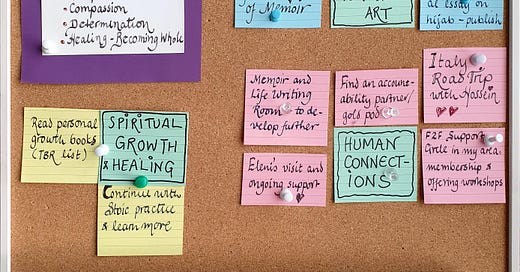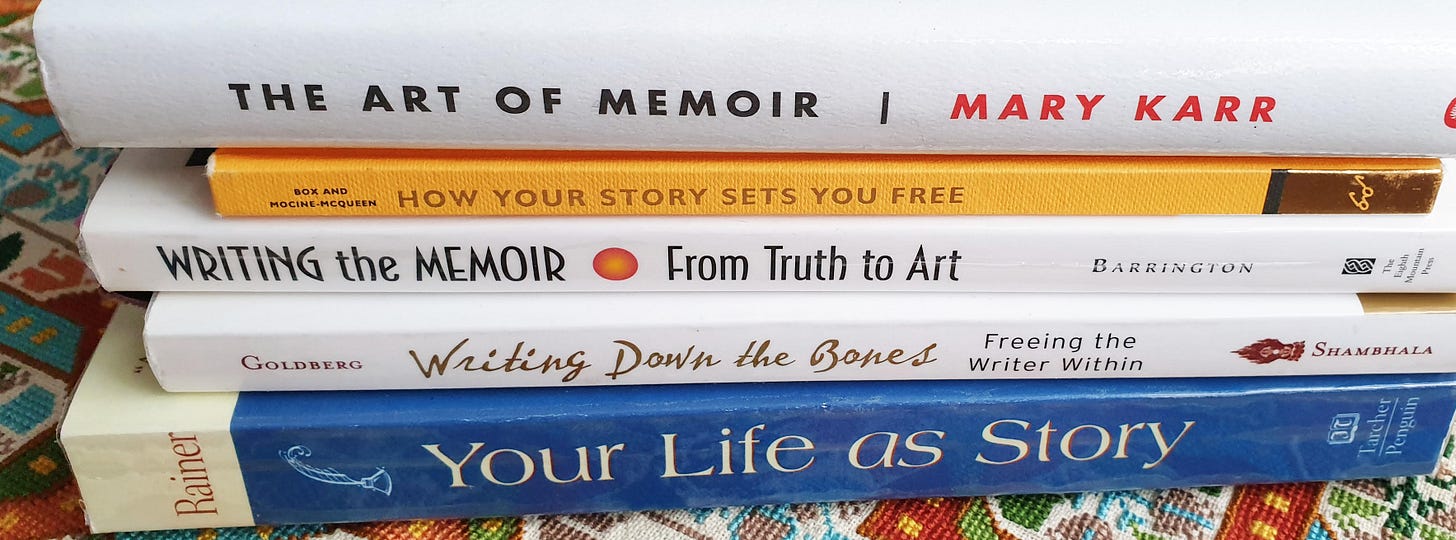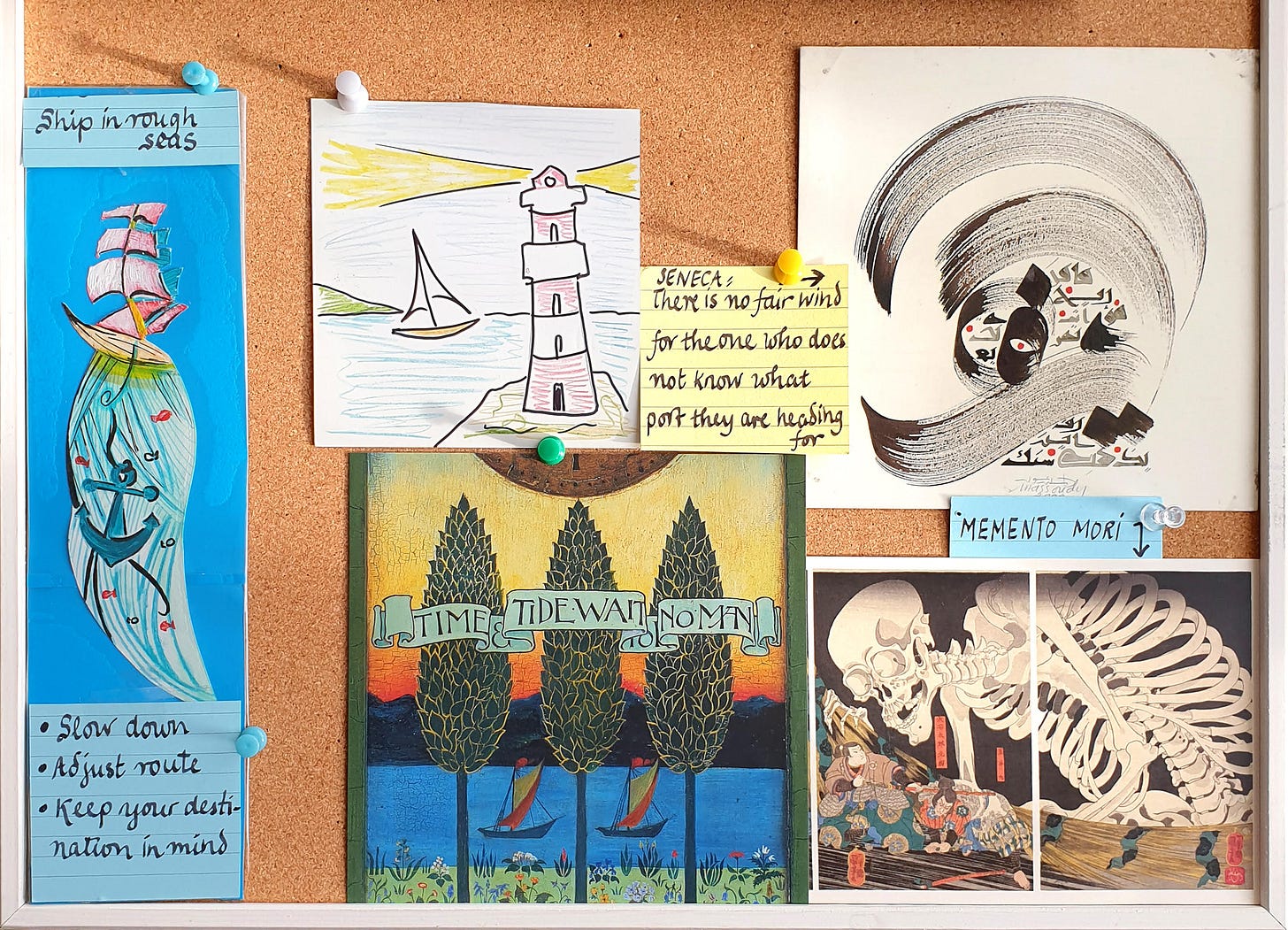Last year's blessings and new year's visions
The puzzle pieces begin to make sense
Happy New Year!
This newsletter is now entering its third year: Some little language started life in January 2021 as a monthly newsletter on intercultural communication, language, rituals, books, and the ideas that connect them. As I moved away from academic work and my interests gradually shifted, it evolved dynamically into an exploration of experiences and topics that feature in my thinking. It is still about human connections and continues to explore the recurring themes of Stoicism in everyday life; writing from life and the writing life; and Eckhart Tolle’s teachings in The Power of Now and his other books. I am grateful to you, dear reader for reading, and to the universe for granting me the time and the faculties to keep writing it.
My transition to the new year was bookended by two reflective workshops at the thriving community of creatives that is The London Writers Salon. The first was an 2022 End-of-Year Reflection Workshop on the 28th December. I’d like to share an experiential takeaway from one of the activities. The task was to draw two columns in my journal, one of ‘positives’ and one of ‘negatives’. Being generally a balanced pessimist (‘hope for the best but prepare for the worst’), I expected the two columns to come about roughly equal. As I skimmed the weekly diary, the ‘positives’ column on the first page filled, ran over into a second and third page, while the first ‘negatives’ column remained half empty, which goes on to prove (once more) the wisdom of count your blessings.
One of the highlights of last year was the Stoicon Women’s Courageous Paths to Flourishing Conference after which I won a coaching call with poet and philosopher Simon Drew. I was grateful for the discussion on the application of the four Stoic virtues (courage, justice, temperance and wisdom) and for the clarity I gained after this conversation. If you would like to know more, read the blog post I wrote about the session here.
Another highlight was the filming of a documentary on the impact of Eckhart Tolle’s teachings on the participants of The Power of Now Meetup group (I have written about a face-to-face mini-retreat with this group in an earlier post). Flexible films have now launched their brand new YouTube channel Learning in Factual Film Tales with the aim of promoting resilience, reflection, compassion and community. Soulful couple Sybil and Russ interviewed Neil French, the meetups host, and eight group participants (including myself) and have put together a diverse and inspiring documentary. The LIFTT YouTube channel trailer is here, and the full documentary Still Learning - with Eckhart Tolle here.
The second workshop that framed the new year was Dreaming Big in 2023: A Goal Setting & Vision Boarding Workshop on 4 January 2023. it provided the inspiration for this year’s vision board. The top part of the board (shown above) features the three main themes in my life this year, on green cards, and the specific manifestations in coloured cards around each theme. The same themes were present in the 2022 vision board, but as I was putting this one together I had a feeling of homecoming, as if the puzzle pieces are beginning to look more like a coherent picture.
Did you do a vision board or any other visualisation? I’d love to know!
The rest of the strands…
Memoir and Life Writing Group
Our supportive group, Memoir and Life Writing group at The London Writers Salon continues to meet up on the 1st and 3rd Thursday of each month, to get to know each other, talk about our work and share experiences and resources.
Our next community meeting is on Thursday 19 January, 5-6 pm GMT.
If you would like to join hundreds of other writers writing in community, join the free Writers’ Hour; one of the four daily sessions is bound to fit in with your daily schedule. We can’t wait to welcome you and to write together!
…and the long-haul project: 52 weeks to a Good Life
Our friendly, wise, supportive community at the Stoic Salon is now coming up to the end of the book Live Like a Stoic: 52 Exercises towards a Good Life, and has met live on zoom twelve times so far. The authors Massimo Pigliucci and Gregory Lopez have joined us twice to answer questions from the community, once shortly after the beginning of our journey (26 February 2022) and once halfway in, on 23 July 2022.
We are now towards the end of the Discipline of Assent. Three more weeks to go!
Week 46 – Pause when angry
[…] if you gain time and delay, you will find it easier to control yourself.
(Epictetus, Enchiridion, 20)
“Time and delay” is a recurring idea highlighted in previous lessons and in other traditions: “space” in contemporary discourse.
The point that it is possible to be angry without realising it is especially resonant. I have harboured deep, repressed anger for decades but I was unaware of it. More than 17 years ago, after a Reiki treatment the practitioner said that she felt the liver area very heavy and asked whether I felt anger. I couldn’t think of anything. Fast forward fifteen years ago in a Counselling Skills class: the instructor said that she had stored repressed anger for years and years because in her natal family only her father was ‘allowed’ to express anger. If anyone else did, they got punished or even beaten up. She added that she only became aware of the existence of that anger during her counselling training. A switch flicked on.
Soon after the end of the course, in January 2020, I was diagnosed with liver cirrhosis. I am now grateful for the diagnosis, because it set in motion the process of working through numerous issues, some of which are still being processed.
I am now more able to discern the first signs of anger as the lesson details: it first feels like a hard ball in the solar plexus. I pause, and examine my assumptions: I seem to be assuming that those close to me are or need to be fully attuned to my needs (as I assumed my mother should have been). However, the reality is that others function very differently, mentally and emotionally, and are dealing with their own issues, so it is unrealistic to expect such attunement. Taking deep breaths and opening up the space to remind myself of this idea seem to help.
Week 47 – Analyse anger and Week 48 - Counter anger with maxims
Our online discussion on 17 December 2022 helped a lot with exploring the roots of anger, and with identifying some steps that may be useful when I feel angry. The following are the notes I made for myself after the meetup.
STEPS TO FOLLOW WHEN ANGRY
Step back to catch it
Avoid escalation
Take deep breaths, physical movement like walking, jogging, shaking on the spot, dancing
Be present
Rehearse the Stoic teachings (see below)
One of our wise Stoic friends, Delphy, shared her summary of Marcus Aurelius’ Meditations 11.18: against anger (with the help of a course by Donald Robertson). I reproduce her notes with permission and lots of gratitude to both.
1 - We are naturally social animals designed to help one another. What is my relationship to people?
2 - Consider their character as a whole. What sort of person is upsetting me?
3 - Nobody does wrong willingly, but by ignorance.
4 - Nobody is perfect, yourself included.
5 - You can never be certain of other people's motives. Is the other really at fault?6 - Remember we will all die.
7 - It's our own judgement that upset us. I am actually disturbing myself.
8 - Anger does us more harm than good. I'm choosing to prolong my suffering.
9 - Nature gave us the virtues to deal with anger. A good disposition is invincible.
10 - It's madness to expect others to be perfect but to let them hurt others but not hurt you is wrong.
My brief checkout this week is this: I am gradually arriving at the conclusion that the deep-seated anger I am contending with is rooted in my assumptions that others should behave in this or that way, and I become angry and frustrated when they don’t. I expected my mother and my husband to see me in the way I wanted and I feel that they didn’t/don’t. This realisation brings me full circle to the dichotomy of control: I had/have no control over their behaviour, only over my responses towards it. I need to turn inward, and see myself as I want to be seen. A lot more work seems to be needed here, but the examination of assumptions and assents seems a promising avenue.
Week 49 - Speak just the facts about others
This week’s lesson focuses on the fact that we often judge others’ behaviour without knowing enough about their motives, personal history or any other factors that can influence it. It argues that in order to make the ethical decision of suspending judgment, one can use neutral, descriptive words rather than value-laden ones. The expression That jerk cut me off, can be rephrased as Someone is in a hurry to get somewhere.
I am very late to the process of learning about the effects of past trauma and of recognising them in myself and (possibly) in others; it has been less than three years. I have spent a good – no, let me rephrase that – considerable part of the most productive and healthy years of my life judging the bad (oops, there I go again!) behaviour of others, while being quite unable to see where I was going wrong myself (I give up).
What was I missing (and often still do)? The awareness, the humility even, that I simply can never know what goes on in the mind of another. How could I ever presume such knowledge and jump into value judgments? I was completely unaware of what went on in my own mind, let alone that of others. Even now I am for the most part unaware of my mental processes, except for some encouraging moments here and there.
It has been a humbling lesson. I recalled Socrates’ words I only know one thing: that I know nothing. If only I could consolidate this one thing, and for the rest, become like a camera that does not see my aging aunt, now in hospital, as stubborn, but as a patient who refuses treatment. I tell myself, Sophie, you simply don’t know, so suspend judgment, and can only hope that sometime this will become my default response. I remind myself that I can only do my best in trying, and that detachment from the outcome is also an important Stoic teaching.
There may be some hope after all that some of all the learning will stick.
The next and final meetups for the 52 Weeks programme are on 21 January and 4 February, 4-5 pm GMT. You can still join us, even if you haven’t got the book. Head over here, check out the latest message on the bottom of the feed, and sign up.
BUT THE STOIC LIFE GOES ON…
This particular cycle is about to close at the end of January, but the Stoic life-long journey continues. Will you join us? More inspiring events are on the cards for this year, so make sure you sign up at the Stoic Salon. We always welcome new friends!
The heart meets the (left) hand in an embrace of imperfection
Coming full circle to the theme of planning the year 2023, the Dreaming Big in 2023: A Goal Setting & Vision Boarding Workshop concluded with a collection of favourite quotes. These formed the bottom half of my 2023 vision board. Coincidentally - or maybe not quite so - four of these related to ships and sea journeys.
The tall ship at the very left of the image reminds me of the advice of my father, a sea-captain who had crossed the Atlantic and the Pacific many times. He used to say that when a storm rages and the huge waves hit at the vessel from straight ahead, you reduce speed and adjust your course so that the waves hit you from the side. You are still heading for the port of your destination: you may reach it later than you recorded in your route plan, but you do everything in your power to reach it safely.
The lighthouse image reminds me that every human can just stand still and cast light around them for those who may need it.
Just below it is a detail from an old clock at the V&A Museum, to remind me of the need to ride the tide at the most opportune moment.
The Arabic calligraphy is this quote by Seneca:
If one doesn’t know what harbor to make for, there can be no favoring wind.
(Letters to Lucilius, 71:3, tr. M Graver & A A Long)
And the one on the bottom right is a Japanese block print that reminds me of one on the main tenets of Stoicism: Remember you will die. Not as a depressing thought, but as gratitude for being alive now and as a reminder for making the most of this moment.
Do you have any favourite go-to quotes or words of wisdom for the new year?
Do share them in the comments.







Lovely, wise words and a good reminder we are all learning. I will be more reflective this week as a result of reading this, thank you x